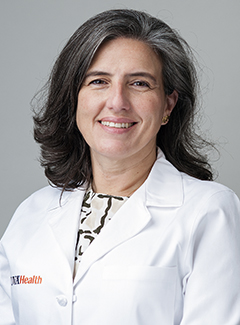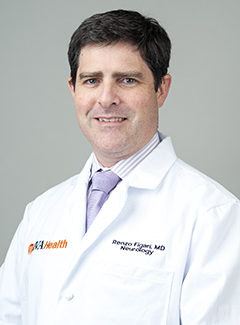Recognized by the American Parkinson’s Disease Association and the Huntington’s Disease Society of America, among others, UVA Health has a long history of excellence in the care of patients with neurological disorders. With its unwavering commitment to research, this academic medical center has laid the groundwork for next-generation treatments and potential cures for some of the most challenging of these disorders. And its comprehensive care model has helped make quality of life for both patients and their caregivers a priority. Recently joining this multidisciplinary team are two experienced specialists profiled below.
Get to Know: Anelyssa D’Abreu, MD
Title: Associate Professor
Residency: Thomas Jefferson University Hospital
Fellowship: Geriatric Neurology, Memorial Hospital of Rhode Island at Brown University
When did you arrive at UVA Health?
I started at UVA in September 2020. Prior to that, I worked at the Memorial Hospital of Rhode Island, which is associated with Brown University, for four years. That is also where I completed my fellowship in geriatric neurology.
Why did you choose to specialize in neurology?
I always liked neuroscience. There was no “aha” moment. Neurology just made sense to me. I knew I wanted to be primarily an outpatient physician and work with patients with chronic disorders, people I would keep seeing and could develop a relationship with. Those were the major things I considered when it was time to make a choice.
What are the challenges of caring for patients with neurodegenerative disorders?
There are no curative treatments for the patients I treat. When you don’t have a medication to fix the problem, it’s more challenging, but it can also be rewarding. You find little things you can do to make their lives better. If they have depression, sleep problems, behavioral problems, if they need physical therapy … we can provide symptom relief to help them live a better life. We make sure patients and caregivers have access to the proper tools to navigate the disease by connecting them to resources available in the community,
How has the care of these patients changed or improved?
We’ve become more aware that it is necessary to improve the quality of life not only for the patient, but also the caregiver. There are services we can offer to address some of the social determinants of health. We are doing a better job in general realizing that coordination of care is really helpful for these patients – understanding just how beneficial and impactful it can be for them.
What will be your research focus?
I am interested in the study of alternative healthcare models to care for patients with neurodegenerative disorders. The number of patients with Alzheimer’s disease and other dementias is expected to grow exponentially. Minority groups will be disproportionately affected. My goal is to make sure we can address the huge increase in the number of cases. The concern is that there are not enough neurologists in the U.S., or neurologists are not widely distributed. We have to either train new doctors or devise mechanisms that will allow us to use alternative ways, such as telemedicine, to care for these patients. Developing partnerships with primary care doctors in remote areas, for instance, will help us care for those patients outside of our clinics.
What are the advantages of being cared for at a large academic medical center like UVA?
First, UVA offers a comprehensive care model. We have specialty clinics like the Memory and Aging Care Clinic with neurologists, neuropsychologists, social workers speech pathologists, occupational therapists and others trained specifically in caring for patients with dementia. A proper diagnosis is so important and we have all the current tools available to ensure an accurate diagnosis. For patients interested in research participation, being cared for at an academic medical center like UVA gives them many opportunities. And if one of those new treatments from a clinical trial is approved, academic centers have the resources available – the space and trained personnel – to administer those treatments. The current drugs under study are not oral therapies, so it’s necessary to have a specialized setting to offer those treatments.
Are there any treatments you’re especially excited about?
There are a few promising studies under way. The new drugs are not just for treating the symptoms of disease, but thinking about the disease process. They are expected to halt the disease process or even go backwards to reverse some of the damage that has taken place. I think the mechanism of these new drugs, based on the pathology of disease, are interesting and might be effective.
What are some misconceptions about treating patients with dementia?
There is often a misunderstanding that, because we don’t have disease-specific treatments for Alzheimer’s or frontotemporal dementia, for example, that there is nothing to be done. That’s not true. There are different resources and different medications that might be beneficial for one, but not the others. The prognosis of these disorders is different, as well as the risk for other family members. That’s why having a proper diagnosis is so important. It’s not perfect, but it makes a difference in the quality of life of the patient and caregiver if we are able to do the right thing.
Get to Know: Renzo Figari Jordan, MD
Title: Associate Professor
Residency: Henry Ford Hospital
Fellowship: Neurology; University of Maryland
What attracted you to UVA at this point in your career?
I’d been working in private practice at Augusta Medical Center for the past 8 years and I wanted to work more closely with medical students and residents.
What do you find most rewarding about educating students and residents?
I think knowing that you’re helping prepare future generations of neurologists. Right now, we know there’s going to be a lack of neurologists in the future. So an important contribution to the field is to help train these physicians.
What will be your clinical focus?
I will treat mainly movement disorders, such as Parkinson’s disease. I also have a personal interest in functional neurological disorders.
How is UVA unique in its approach to treating patients with movement disorders?
In addition to our team approach to care, which includes neurologists, physical therapists, neurosurgeons and others, I think one of the key things that UVA offers is the advanced treatment of Parkinson’s disease, including deep brain stimulation and focused ultrasound, which was pioneered here at UVA. This provides an option for patients who have especially bad tremors, which doesn’t require surgery.
Was there a moment in your career that confirmed for you that you’d picked the right specialty?
I think that reassurance comes every day with every patient I see. I think it’s highly rewarding to see patients with movement disorders, especially Parkinson’s, because you can see that what you’re doing is impacting their quality of life. That’s the most important thing.
Will you be involved in research at UVA?
Yes, one of my projects coming into UVA was to develop a patient database, trying to capture some specialty measurements in Parkinson’s patients and others with movement disorders. This patient register will continue over years and help us provide a base to do some clinical research. It’s mainly focused on the quality of care we’re providing and the impact that care has on quality of life. Every patient we see will be included in the database. We’ll record some characteristics of their physical examination and the patient will fill out a survey that captures their quality of life at home, how they are doing with activities of daily living. Over time, this data will help improve those measurements because we’ll be able to see what we’re doing in clinic that is actually helping these patients.
You are originally from Peru. Is there anything in particular you miss about home?
Yes, I still have family there. My wife is also from there and she now works at UVA too as a transplant nephrologist. I mainly miss the food. I love seafood, so one of the things I have to have when I get there to visit is ceviche.
To refer a patient to UVA Health, call UVA Physician Direct at 800.552.3723.

